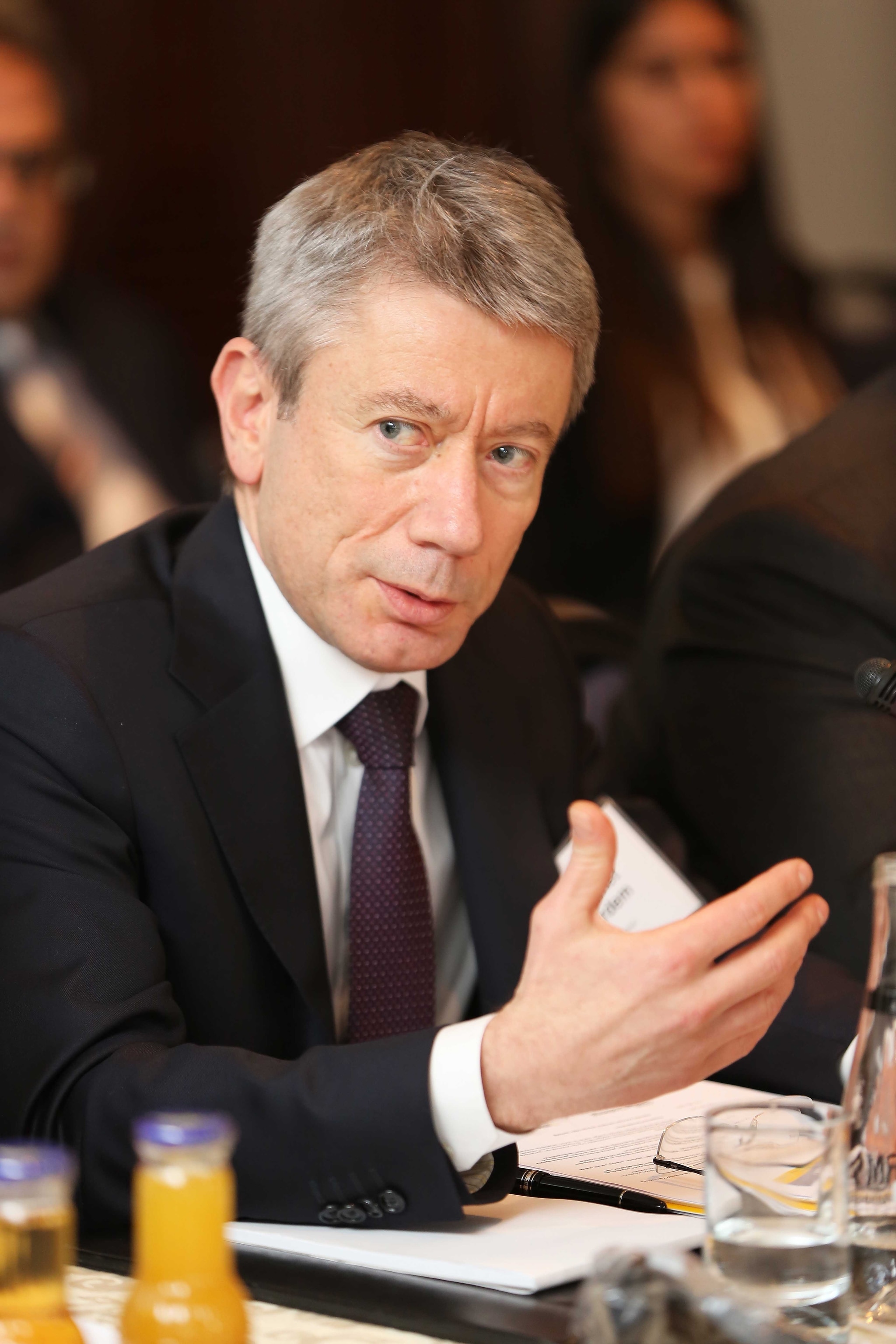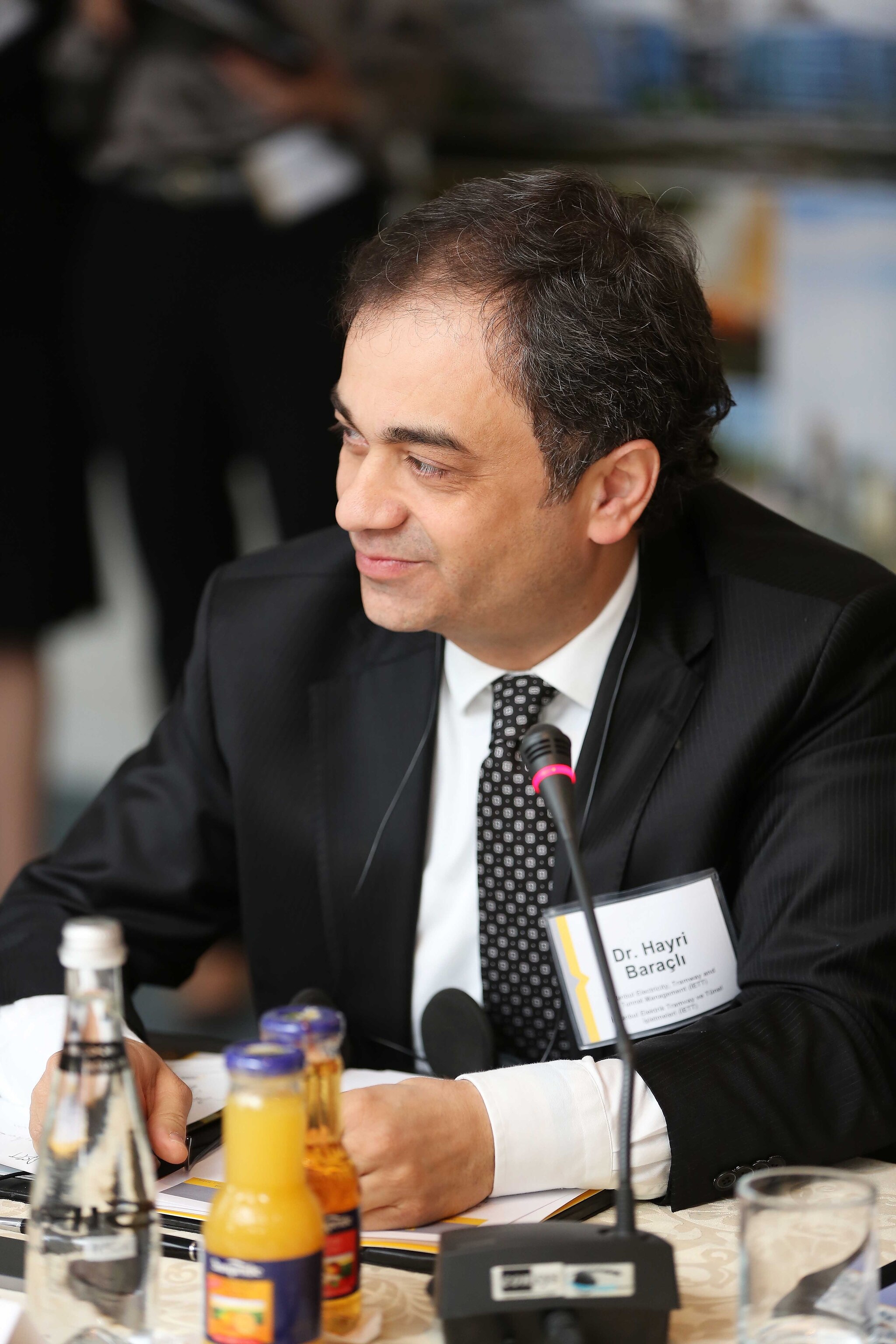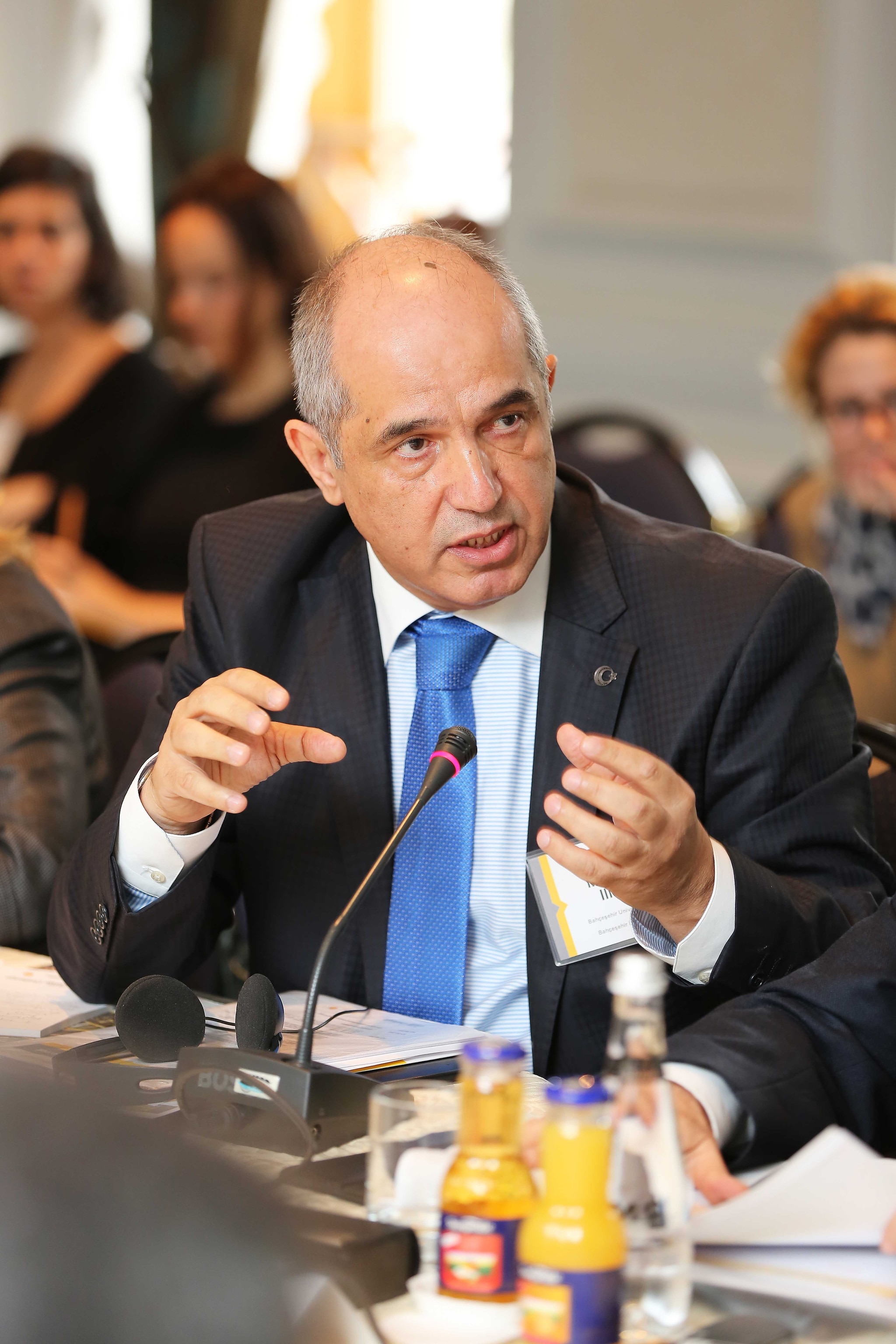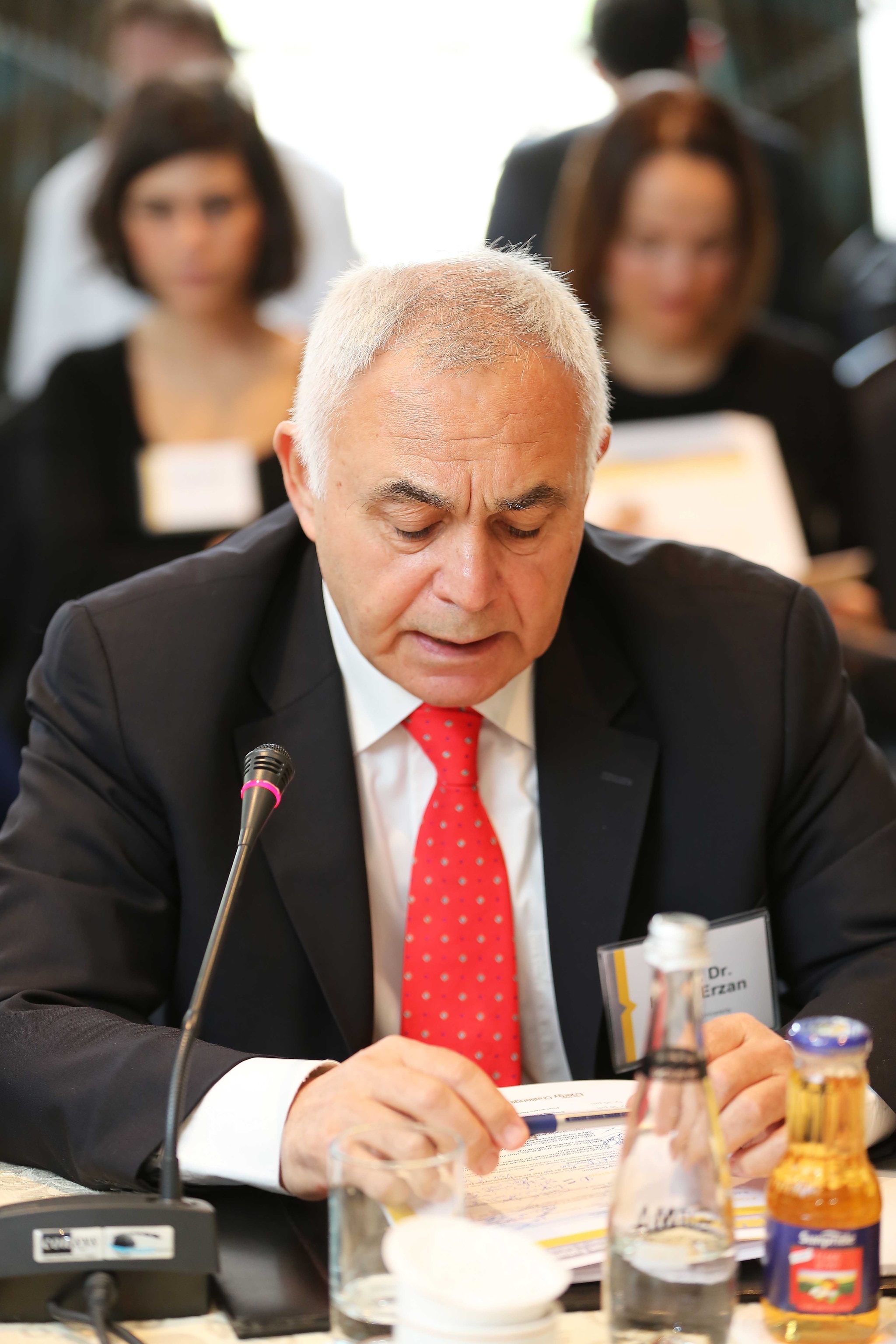












Powering Our Urban Future: Spotlight on Turkey
Istanbul, the only city in the world that spans two continents, is a perfect setting for a close look at the energy and sustainability challenges of our increasingly urban planet.
With 14 million people, Istanbul is the largest city in Europe. But energy demand here and across Turkey is growing at a rate more typical of much of Asia—about 45 percent per year, says Volkan Ediger, energy systems engineering department head at Istanbul’s Kadir Has University.
Ediger, who served as energy adviser to Turkey’s president under three successive administrations from 1998 to 2010, led the latest in a series of roundtable events convened by National Geographic as part of its Great Energy Challenge initiative, sponsored by Shell. (Read about our previous forums, Biofuels at a Crossroads, and The Arctic: Science of Change.) Some 25 academics and government officials, along with representatives of industry and nongovernmental organizations, gathered in Istanbul on Wednesday to discuss the challenges facing Turkey’s cities. (You can see video from the Istanbul event here.) The discussion shed light on the problems facing metropolitan areas around the world that are grappling with transportation congestion, the need for more secure and cleaner sources of energy supply, and that want to maintain a livable environment as their populations grow. (Related Quiz: What You Don’t Know About Cities and Energy.)

Turkey’s energy landscape is marked by three realities in addition to the rapid growth of demand, said Ediger. The nation is highly dependent upon foreign energy sources—especially natural gas imported from Russia; it is about 90 percent reliant on fossil fuels; and Turkey is not as energy efficient as other developed countries, he said.
Panelists emphasized the need for city planning that takes into account the suburbs. They called for greater realization that there is no single solution either for transportation or for secure energy supply. And they emphasized the need for government and stakeholders to work together cooperatively for solutions. Here’s a sampling of their ideas:

Mustafa Ilıcalı, director of the transportation department of engineering, Bahçeşehir University: “I think the biggest problem in many of the cities in Turkey is transportation, and . . . the main issue here is the problem of regional development. There is a very high level of migration into cities and of course there are increasing demands. I think transportation planning is not being done efficiently and [is] the biggest problem Turkey has had. All of these demands in İstanbul must be tackled in the framework of a transportation master plan.
“We have a ten-year development plan but can we really implement [this]? You know, there [are] the efforts on municipality side and efforts on the central government side. . . These efforts do not necessarily complement each other. This means that there is a need for effective governance and a coherent coordination. We really must concentrate on human resources, coordination. If we really can manage to be successful in this, I think we will gain more concrete results. And we have to be a part of the European Union so that we can reduce the development gap between our regions.”

Arzu Tekir, director of EMBARQ TURKEY, Sustainable Transportation Association: “Back in 2000, 64 percent of the Turkish population was living in cities, but it has gone up to 78 percent. I think rapid urbanization and the development of the [suburban] regions is an important problem and . . . transportation systems cannot keep up. We have to think about trans-oriented development. We have to create compact cities. We have the metro-bus systems and we have similar alternatives for sustainable systems. I think we have to try and ensure that cities grow within the framework of these transportation frameworks.”

Philippe Crist, administrator of the International Transport Forum, the Organization for Economic Cooperation and Development (OECD): “There is no single transport mode that can absorb all of [the new] mobility—not cars, not public transport, not walking, even though walking accounts for almost half of our trips in cities like İstanbul. Not cycling, which accounts for almost nothing in many Turkish cities.
“The real challenge will be two things: managing hyper-dense cities . . . and very low density suburbs. How do you provide adequate access in transport services to those two very different areas?”
“The reason that you see, for example, the takeoff of the two-wheeled electric bicycles and scooters in China is because of the high fares for the metro system. And at the same time the restrictions given to petrol-driven two-wheelers as a way of driving people into the metro system. And people are very resilient. They also like individual mobility. All I’m saying is that the takeoff of electric mobility in the world hasn’t been in electric cars. It’s been more in a quasi-form of public transport which is sometimes shared electric vehicles, but they’re two-wheelers and are very light. I would assume or expect that in the major cities, in the major mega cities in the world, the solutions for public transport will be hybrid, just like the solutions for energy will also be hybrid.”

Selahattin Hakman, energy group president, Sabancı Holding: “These huge urbanization efforts contribute to the very high electricity demand in Turkey. And this creates a huge challenge to supply the necessary electricity especially to the cities. There are many reactions instead of plans before actions. I think this is the highest challenge in Turkey, [the demand that] cities are creating in terms of energy and electricity usage.”
“I think the most important fuel not only for Turkey but globally is increasing the energy efficiency.”
Göktuğ Kara, manager, transport policy and infrastructure investments, delegation of the European Union to Turkey, European External Action Service: “The biggest issues that we’ll be facing as Turks in the upcoming decades will be urban sprawl—the cities are extending without any plan, just according to the mayor’s vision, so there is a huge loss of efficiency in terms of planning. Given the motorization rates, traffic congestion will be what the ordinary Turk will be complaining, and lastly accessibility of infrastructure, as the population will be relatively ageing.”
Fazıl Şenel, board member of Turkey’s Energy Market Regulatory Authority: “I personally think that the biggest problem is protecting the environment. In other words, we have one single world, we have one single planet and we’ll live on this planet. So if we’re going to generate energy, we must ensure that we use environment-friendly energy. We need to ensure that we consume energy in an environment-friendly way.
“In addition, Turkey generates less than one percent of the carbon dioxide around the world. And we know that the majority of the carbon dioxide comes from the [United States] and the Western world. Of course, you have to think about India, as well as China. So I think that the main solution lies on this fact. I’m not denying Turkey’s role. Of course Turkey needs to improve itself, but I think that countries that have a large share in carbon-dioxide generation need to set an example to others.”

Hayri Baraçlı, general manager, İETT (Istanbul Electricity, Tramway, and Tunnel): “İstanbul of course is a unique city. . . As we discuss these problems, of course, we’re not just looking at the issues that relate to İstanbul. We have to see urban issues as a whole. And, as a general perspective, we have to also think about environment, energy —I think this is being part of the urban culture. Of course, our cities are combined cities—there is industry, there is tourism, there [are] residential units. It may be worthwhile to try and move these functions to different cities. And also in İstanbul of course, transportation and life —they go hand in hand, so we have to think about all of the different means of transportation. We are now trying our best to integrate these but we have to continue to work.”
Isabel Gomez Cagigas, country general manager, IBM Turkey: “We have to rethink and redesign the city. It’s a must. . . Technology exists. Smart grid, management of energy efficiency, management of demand. All of these have been invented. The world is moving very very fast. We will see new things that will come up, but everything is again on us to do it and work together.”

Ahmet Erdem, Shell Turkey country chairman, “From the energy perspective, of course we discussed . . . denser cities being more efficient, but at the end we face a challenge there in order to supply the energy to meet the demand. That is very much relevant to keep our cities sustainable and also for the sake of the quality of life of the people who choose to live there. . . We need to look for new sources of energy, but there is one thing clear: With this kind of demand, there is no single or two, three sources. It has to be a well-balanced mix of everything that will also guarantee uninterrupted supply of energy.”
Mustafa Serdar Ataseven, chairman of the Turkish Wind Energy Association: “You have to ensure supply security. That’s very important. Secondly, you have to find ways of responding to this demand at the low-cost level. And also you have to concentrate on environmental friendly solutions.
I think Turkey actually . . . is in a position to optimize it. You know, we have been using coal and imported coal and we are talking about, of course, and oil are the mail resources for Turkey’s energy. Turkey has substantial renewable energy potential and it’s not really using this at the very high level.
“When you make use of this renewable resource, first of all, this is an independent energy resource, which is very important. And secondly, politically speaking, you will be independent. Plus, you will have a sustainable and semi-low-cost energy resource. And other countries must also find a way of developing their renewable sources because sustainability is key here.

Refik Erzan, professor, department of economics, Boğaziçi University: “We have to reduce the commuting distance in the cities. We have been so far doing just the opposite. We have a phenomenon called ‘servis.’ We are giving free transport to people back and forth the bridges and everywhere. So people are traveling tens of miles every day. Now the contrary should be done. That has contributed very much to people commuting tremendous distances. We have to give some tax incentives and other kinds of subsidies and whatever so that people live closer to where they work and go to school. That also implies on planning, city planning.”
Dick Benschop, president director, Shell Netherlands, vice president, gas market development: “The world is in two races at the same time. We are in a race for development and against poverty—this is one race. And we are in a race against climate change and for the environment. We can’t exclude one of those races. We have to run them both. We have to run them at the same time and we have to run them successfully. You can see that of course in fast growing countries like Turkey you see that happening in cities as well, where all of those issues come together, both the challenges and the opportunities.
“Something which we are looking at . . . is the potential of decentralized power generation. If you think about the vitality of cities—that can be through renewable, various forms of distributed renewable energy like solar energy, or thermal have been mentioned, it can also be through the use of natural gas also increasing efficiency through combined heat and power generation. You will receive a high efficiency result there. There is not one solution. We need a broad set of solutions. The headline I use for it—it’s a combination of clean and green solutions.”

Konca Çalkıvik, executive director, Business Council for Sustainable Development—Turkey: “The most critical problem is the lack of long-term planning. And it was said before, but we mustn’t expect long-term planning from the government. I think [nongovernmental organizations] have a great role to play, but we have to find a way of bringing NGOs and the government bodies together so that they can develop some initiatives together. I think this can only be done through collaboration, through cooperation. Otherwise, I think we shouldn’t just sit back and wait for the government to pass some laws and try and resolve these issues.”
You May Also Like
Go Further
Animals
- How can we protect grizzlies from their biggest threat—trains?How can we protect grizzlies from their biggest threat—trains?
- This ‘saber-toothed’ salmon wasn’t quite what we thoughtThis ‘saber-toothed’ salmon wasn’t quite what we thought
- Why this rhino-zebra friendship makes perfect senseWhy this rhino-zebra friendship makes perfect sense
- When did bioluminescence evolve? It’s older than we thought.When did bioluminescence evolve? It’s older than we thought.
- Soy, skim … spider. Are any of these technically milk?Soy, skim … spider. Are any of these technically milk?
Environment
- Are the Great Lakes the key to solving America’s emissions conundrum?Are the Great Lakes the key to solving America’s emissions conundrum?
- The world’s historic sites face climate change. Can Petra lead the way?The world’s historic sites face climate change. Can Petra lead the way?
- This pristine piece of the Amazon shows nature’s resilienceThis pristine piece of the Amazon shows nature’s resilience
- Listen to 30 years of climate change transformed into haunting musicListen to 30 years of climate change transformed into haunting music
History & Culture
- Meet the original members of the tortured poets departmentMeet the original members of the tortured poets department
- Séances at the White House? Why these first ladies turned to the occultSéances at the White House? Why these first ladies turned to the occult
- Gambling is everywhere now. When is that a problem?Gambling is everywhere now. When is that a problem?
- Beauty is pain—at least it was in 17th-century SpainBeauty is pain—at least it was in 17th-century Spain
Science
- Here's how astronomers found one of the rarest phenomenons in spaceHere's how astronomers found one of the rarest phenomenons in space
- Not an extrovert or introvert? There’s a word for that.Not an extrovert or introvert? There’s a word for that.
- NASA has a plan to clean up space junk—but is going green enough?NASA has a plan to clean up space junk—but is going green enough?
- Soy, skim … spider. Are any of these technically milk?Soy, skim … spider. Are any of these technically milk?
Travel
- Dina Macki on Omani cuisine and Zanzibari flavoursDina Macki on Omani cuisine and Zanzibari flavours
- How to see Mexico's Baja California beyond the beachesHow to see Mexico's Baja California beyond the beaches
- Could Mexico's Chepe Express be the ultimate slow rail adventure?Could Mexico's Chepe Express be the ultimate slow rail adventure?







